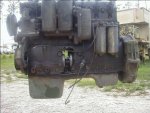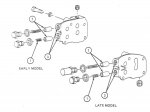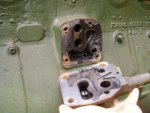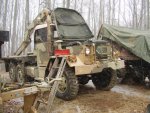- 10,350
- 74
- 48
- Location
- Meadows of Dan, Virginia
My multifuel has been making a "clack, clack" noise for some time, perhaps for 6,000 miles now. It comes from the upper portion of the engine and occurs about 3 to 4 times/second at approx 800 rpm. Hard to tell, but could be #5 or #6 piston.
It is more pronounced at low rpms and can not be heard at all above 1,500 rpm or so. Not the clicking sound from tappets.
A bad rod bearing would come from the lower portion of the engine, correct?
The engine has never been overrevved while I have owned it (ten years).
No smoke, no loss of power, starts easy and fuel is regular diesel at the moment.
Replaced all injectors and no change.
What about the rod-to-piston connection, can that bearing make a noise?
Guess it can, but anyway, I'm no expert.
Oil pressure is kind a' low, perhaps 20 psi only and that's on the highway, so that's another project. Oil and oil filters have been changed within the last 3,000 miles.
During my cross country trip many people heard the sound, but had no particular reaction to it. Patrick and Peter gave it a listen when they visited and had no comment as I can remember.
Any input or thoughts would be appreciated.
It is more pronounced at low rpms and can not be heard at all above 1,500 rpm or so. Not the clicking sound from tappets.
A bad rod bearing would come from the lower portion of the engine, correct?
The engine has never been overrevved while I have owned it (ten years).
No smoke, no loss of power, starts easy and fuel is regular diesel at the moment.
Replaced all injectors and no change.
What about the rod-to-piston connection, can that bearing make a noise?
Guess it can, but anyway, I'm no expert.
Oil pressure is kind a' low, perhaps 20 psi only and that's on the highway, so that's another project. Oil and oil filters have been changed within the last 3,000 miles.
During my cross country trip many people heard the sound, but had no particular reaction to it. Patrick and Peter gave it a listen when they visited and had no comment as I can remember.
Any input or thoughts would be appreciated.









